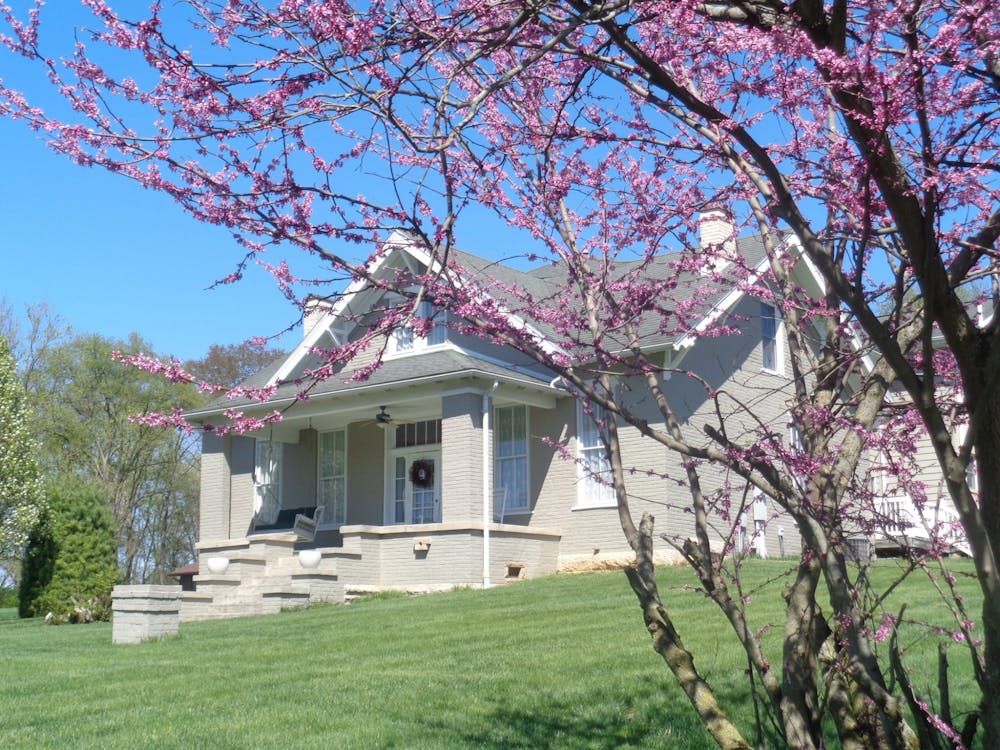It was supposed to be their last job before retirement. A last big endeavor after a life full of adventure that had brought them from Indiana to the Rocky Mountains and back.
But Zack and Donna Malham, resident hosts of Wampler House Bed and Breakfast, now have their only source of income on the line. Having closed the house on March 17 due to coronavirus, the 68-year-old couple now live off social security while mostly relying on government grants to keep their business.
Located south of Bloomington, the Wampler House is a historic property built in 1857. Zack and Donna acquired the house in 2015 before they learned it was less than a quarter of a mile away from where they lived as newlyweds in 1977. Bloomington was where the couple first met, dated and got married.
Here, Zack studied under a professional chef for three years, whom he said catapulted his career into becoming a corporate chef without attending culinary school.
“That just doesn’t happen anymore,” he said. “Opportunities like that don’t present themselves anymore.”
Zack got a chef position in Denver, Colorado, and he and Donna spent 40 years in the restaurant industry there. They dictated their own schedules, worked long hours and rewarded themselves by traveling across the United States.
But in these 40 years of what Donna calls a “side trip” in the West, the couple had always thought of Bloomington as home. Having planned to run a bed-and-breakfast for 20 years, they decided to return to Bloomington in 2015. Before long, they purchased the eight-room Wampler House, already a B&B under its previous owners.
“That’s an absolute full circle – Halley’s Comet,” Zack said. “I mean, this was just meant to be.”
For the past five years, Wampler House has welcomed regional guests as well as Bloomingtonians looking for a stay-cation. The couple lives on-site, and Zack said although there are high and low seasons, the business usually keeps them busy.
As the COVID-19 pandemic spread across the U.S. in mid-March, the couple had to shut down the B&B, both being in the high-risk age group for the virus.
Brandon Howell, lecturer in the Department of Health & Wellness Design at the School of Public Health, said hospitality workers are frontline workers because they deal with the public directly. B&Bs also have more intimate settings than hotels with tighter living spaces and hallways and more interaction between the customers and innkeepers which makes it harder to socially distance.
Andrew Butters, assistant professor at the IU Kelley School of Business, added that B&Bs might be less well-funded to meet rising cleanliness standards and social distancing protocols. For Wampler House, the couple’s only reasonable choice was to shut it down.
Now entering the third month of the house being closed, Zack and Donna are struggling to balance their risk of exposure and running dry on money, like many small business owners throughout the country. Zack calls this “panicking in place."
“Without heads in beds, we’re dead in the water,” Zack said. “We have no revenue.”
The couple’s personal living costs are now entirely dependent on social security, which includes mortgage and utility bills for their own residence separate from Wampler House.
“The meter kept running,” Zack said.
The expenses include money owed to vendors, utility companies, insurances, mortgage plans and internet costs. Zack said he has tried to be transparent and reach out proactively to these businesses. Talking to people about money has become his daily routine.
But there have been glimmers of hope. Zack said people have been forgiving about money challenges.
“Everybody’s working with everybody to get people through this because this is real," he said. "This is not a test."
With the help of government emergency relief grants, they have managed to keep their business. A small proportion of the relief came from the federal Payment Protection Program, but Zack said what really took the pressure off of them has been the Monroe County Food & Beverage COVID-19 Virus Relief grant. It has substantially helped the couple pay for the mortgages and utilities of Wampler House.
“We are both prayerfully optimistic that we are going to be able to survive and ride out the pandemic,” Zack said.
Howell said that before the pandemic ends, the B&B experience will suffer from stricter health protocols.
“What’s sad about the whole thing is that hospitality is based on experience,” he said. “The people who work in these places are the product. If you put masks on, the challenge is we can’t see your smile.”
Butters said it’s hard to make predictions right now. On one hand, more consumers might demand spacious, self-contained suites with amenities that would save the trouble of going to communal spaces, which would be hard for B&Bs to accommodate because of their intimate nature.
On the other hand, Butters suggested people might substitute plane travels with short weekend drives to closer, regional locations, which B&Bs are well-suited for.
This possible trend is what makes Zack optimistic about restarting Wampler House in July. He compared B&Bs to drive-in theaters, which seized on the pandemic to make a comeback when they had been disappearing. He said customers may like a B&B’s smaller, environmentally-controlled setting, easily-accessible hosts and transparency in how everyday operations are conducted.
Currently, Zack plans to discuss with other Bloomington B&B businesses how and when to restart. He said they are committed to reopen Wampler House this summer and keep the business alive beyond 2020.
“If COVID has different plans, then so be it,” he said. “But at least we’re fighting to stay afloat.”
“Safely fighting,” Donna added.




